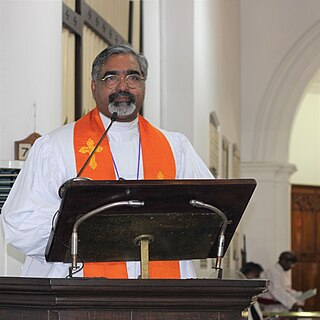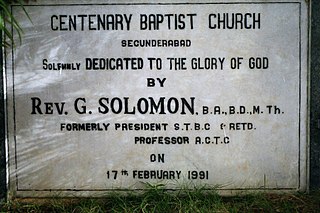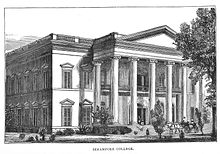
Victor Premasagar (1927–2005) was the fourth successor of Frank Whittaker as Bishop in Medak. He was an Indian churchman and Old Testament scholar who made major contributions to research on the Old Testament and to the field of theology. Premasagar's articles appeared in the Expository Times (1966), the Vetus Testamentum (1966), the International Review of Mission (1972), and the Indian Journal of Theology (1974) and cited in major works relating to the theme of Promise in the Bible and critical works on Psalms LXXX and the Hebrew word HOQ in the Tanakh.

Andhra Christian Theological College (ACTC) is a seminary in Telangana which was founded in 1964. It is affiliated with India's first university, the Senate of Serampore College (University), and has degree-granting authority under a Danish charter ratified by the government of West Bengal. ACTC is on the Hussain Sagar canal (north) in Gandhinagar, Hyderabad, about 4 kilometres (2.5 mi) from the Secunderabad Junction railway station.

Baptist Theological Seminary is a Baptist seminary located in Jagannaickpur, Church Square, Kakinada in Andhra Pradesh, India. It is affiliated with the Convention of Baptist Churches of Northern Circars.
D. S. Satyaranjan was a Silver Jubilee Pastor, a New Testament Scholar, and an Administrator who served as the Registrar of the Senate of Serampore College (University), the nation's first University {a University under Section 2 (f) of the University Grants Commission Act, 1956} with degree-granting authority validated by a Danish Charter and ratified by the Government of West Bengal.
M. Victor Paul was a biblical scholar who served as President of the Andhra Evangelical Lutheran Church from 1993 to 1997.
Ryder Devapriam was systematic theologian who taught during the 1960s and the 1970s at the Andhra Christian Theological College, a Protestant Regional Theologiate in Secunderabad, affiliated to the nation's first University, the Senate of Serampore College (University) {a University under Section 2 (f) of the University Grants Commission Act, 1956}with degree-granting authority validated by a Danish Charter and ratified by the Government of West Bengal.
G. T. Abraham was Bishop - in - Diocese of Nandyal of the Church of South India. He also taught Christian Ministry at the Andhra Christian Theological College. Hyderabad
Acharya A. B. Masilamani or Abel Boanerges Masilamani (1914–1990) was a Golden Jubilee Baptist pastor and evangelist on whom parallels had been drawn comparing his ecclesiastical ministry with that of Saint Paul. The Mar Thoma Syrian Church, one of the Saint Thomas Christian Churches founded by Thomas the Apostle in the first century which holds the annual Maramon Conventions used to have Masilamani preach at its conventions since the 1970s. During one such Maramon Convention held in 1983 at Maramon, Masilamani was one of the main speaker who spoke on Christology in the presence of the two patriarchs of the Mar Thoma Church, Alexander Mar Thoma and Thomas Mar Athanius.

Ravela Joseph was a Sapphire jubilee-Priest involved in Spiritual formation from the mid-1960s into the early 2000s in the Telugu states. He taught Systematic theology in Major Seminaries affiliated to the Senate of Serampore College (University), the nation's first modern University {a University under Section 2 (f) of the University Grants Commission Act, 1956} with degree-granting authority validated by a Danish Charter and ratified by the Government of West Bengal.
Bishop G. B. Devasahayam(born 23 August 1925; died 20 August 1996) was the second elected CSI-Bishop - in - Karimnagar Diocese of the Church of South India who occupied the Cathedra from 1982 through 1987 placed in the CSI-Wesley Cathedral in Karimnagar Town in Telangana, India
Bishop Babbili Prabhudass(died 1996) was the first elected Bishop - in - Karimnagar Diocese of the Church of South India which was ecclesiastically bifurcated from the Diocese of Dornakal of the Church of South India in early 1978. Prabhudass led the bishopric for a period of five years from 1978 through 1982.
Rayi Ratna Sundara Rao was a prolific writer, theologian and comparative religion scholar who once was the principal of the Gurukul Lutheran Theological College, Chennai, affiliated to India's first university, the Senate of Serampore College (University).
S. E. Krupa Rao was a Baptist Pastor of the Convention of Baptist Churches of Northern Circars where he held leadership positions in the Church society whose area of operation extended from Srikakulam District in the northern circars along the Bay of Bengal right through seven districts up to Guntur District.
T. Gnananandam was a Pastor of the Protestant Convention of Baptist Churches of Northern Circars and was Principal of the Baptist Theological Seminary, Kakinada during 1968-1969, the shortest ever in the history of the seminary.

M. Theophilus was a Baptist Patriarch and Spiritual Formator of the Protestant Convention of Baptist Churches of Northern Circars, a major congregation along the Bay of Bengal in Andhra Pradesh, India that extends from Srikakulam District in the northern tip through Guntur District in the middle. Theophilus taught at the Baptist Theological Seminary, Kakinada during the period 1926–1946 and was also Senator of India's first University, the Senate of Serampore College (University) during 1942–1946 taking forward not only the theological concerns of the university but also the concerns of Serampore College, which as a dual University affiliated entity, had the arts, science and commerce faculties affiliated to the University of Calcutta. In matters of Church union, Theophilus actively cooperated with the National Council of Churches in India that not only incorporated the Protestant and the Oriental Orthodox Churches but also reached out to the Catholics.

A. C. Solomon Raj is the seventh successor of Frank Whittaker and eighth Bishop in Medak of the Protestant Church of South India Society and shepherds the Diocese from the Cathedra of the Bishop housed in the CSI-Medak Cathedral in Medak Town, Telangana, India. On 12 October 2016, the Church of South India Synod headquartered in Chennai, appointed Solomon Raj to assume the ecclesiastical Office of the Bishopric of Medak and was consecrated the next day on 13 October 2016 at the CSI-St. George's Cathedral, Chennai, ending four years of sede vacante in the Diocese of Medak which was without a bishop during the intervening period of 2012–2016.

G. Solomon was an Old Testament Scholar and a Baptist Patriarch hailing from the Protestant Samavesam of Telugu Baptist Churches Society (an affiliate member of the Baptist World Alliance and the National Council of Churches in India) and led it as its President during the years 1978-1982 overseeing the spiritual affairs of the Church Society whose ecclesiastical jurisdiction comprises the three states of Tamil Nadu, Andhra Pradesh and Telangana with 873 Churches comprising nearly a million members per present statistics.
M. S. G. Lalitha Kumari a.k.a. Lalitha Krupa Rao was the eighth Principal of Eva Rose York Bible Training and Technical School for Women, Tuni. She held the term from 1993 through 2011. Lalitha was a theologically trained woman who also used to pastor a Church. With her ordination in 1992, she became the first Woman priest in the Protestant Convention of Baptist Churches of Northern Circars.
Nalla Thomas was an Asian Christian and a spiritual personality, who served the Church in Assam and undivided Andhra Pradesh for nearly four decades, spanning the 1970s to the early 2000s. He was known for composing hymns to enhance spiritual direction and devotion. Thomas also served as an Ecclesiastical administrator of the Samavesam of Telugu Baptist Churches Society.
Perupogu Joseph was a military chaplain in the Indian Army Corps of EME and a counselor who taught students in Serampore College, Serampore and Andhra Christian Theological College, Secunderabad.










